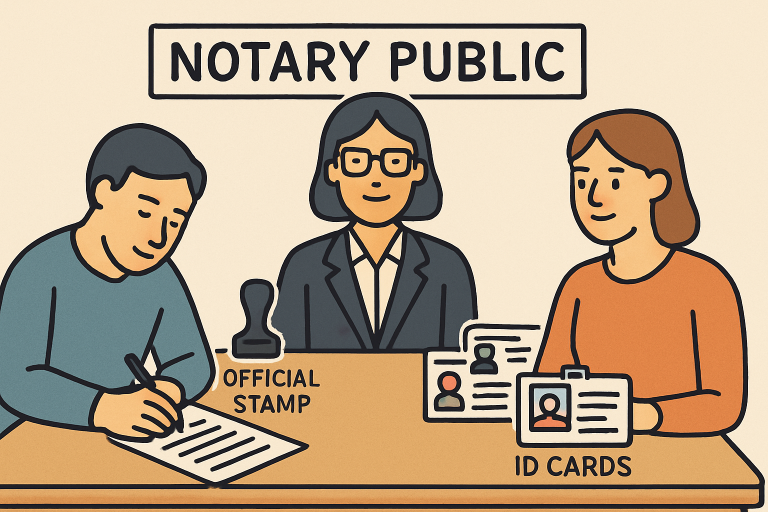Notaries public are trusted professionals who play a pivotal role in safeguarding the legal validity and integrity of countless daily transactions. By acting as impartial witnesses, they help prevent fraud, facilitate the smooth execution of crucial documents, and maintain confidence in civil and commercial matters. Those looking to enter this respected profession or expand their knowledge can benefit greatly from a New York notary course to ensure compliance with all state regulations and best practices.
Whether dealing with sensitive legal agreements, financial transactions, or personal declarations, notaries are tasked with various duties that require diligence, accuracy, and ethical conduct. Their involvement verifies identities and guarantees that all parties understand the significance and consequences of the documents they sign.
The notary’s responsibilities extend well beyond a simple signature and stamp. They are responsible for preventing coercion, maintaining accountability, and in many cases, acting as a bulwark against identity theft and fraudulent activity. These functions underscore why notarial acts are considered essential to the legal system and consumer confidence in notarized documents.
Verifying Identities
The foundation of notarial practice lies in verifying the identity of those involved in the signing process. By thoroughly checking government-issued identification, such as a driver’s license or passport, notaries ensure document signers are indeed who they claim to be. This step not only protects the interests of all parties but also serves as a critical defense against identity theft, which remains a widespread issue in the United States.
Furthermore, notaries are trained to remain vigilant for signs of duress or coercion, asking appropriate questions and refusing to proceed if there is any doubt regarding the signer’s willingness. This impartial oversight helps reinforce the intent behind each signature and ensures the enforceability of the resulting document.

Administering Oaths and Affirmations
Among the most significant powers granted to notaries is administering oaths and affirmations. These solemn declarations require signers to assert the truthfulness of their statements under penalty of perjury, a function commonly used in affidavits, depositions, and other legal contexts. This aspect underscores the notary’s importance in upholding the integrity of civil proceedings and formal records.
Certifying Documents
Notaries often certify copies of original documents, attesting to their accuracy and completeness. This service is especially valuable when presenting original documents, such as educational diplomas, legal contracts, or government records, which are not feasible. By providing this certification, notaries assure recipients of the legitimacy and authenticity of supporting documentation.
Maintaining Accurate Records
Diligent record-keeping is a hallmark of a responsible notary. The notarial journal is an indispensable tool, tracking essential information for each notarial act, including dates, parties involved, identification details, and the type of document signed. These detailed logs offer a trail of accountability that can be critical in resolving disputes or addressing legal challenges long after the original transaction.
High-quality record management is required not only by law in many states but also by best practices across the industry, providing further reassurance to clients and the public.
Upholding Ethical Standards
Impartiality and confidentiality are at the heart of notarial ethics. Notaries must always avoid personal interests that could compromise their judgment and may not notarize documents from which they might benefit. Maintaining strict confidentiality regarding all matters observed during notarial acts is crucial, as any breach could erode public trust and expose sensitive personal or financial information.
Challenges Faced by Notaries
The landscape for notaries can be complex, shaped by evolving legal requirements, increasing incidences of identity fraud, and common misconceptions about their duties. One frequent misunderstanding is the belief that notarization confirms a document’s content or legal intent—in reality, it only verifies the identity and willingness of the signer. Staying current with state law changes and using robust identification procedures are essential for navigating these ongoing challenges.
Becoming a Notary Public
The journey to becoming a notary varies depending on the jurisdiction, but usually involves meeting minimum age and residency standards, completing a formal education or training course, passing a comprehensive exam, and receiving a state-issued commission. Continued education is encouraged—and sometimes required—to help notaries remain well-versed in new regulations and best practices as they evolve.
Final Thoughts
Notaries public are indispensable guardians of integrity, trust, and legality in civil and business transactions. Through their steadfast adherence to identity verification, ethical practices, and meticulous record-keeping, notaries provide crucial protection against fraud and preserve the confidence of all parties involved. Their work remains an essential feature of a sound and trustworthy legal environment.

